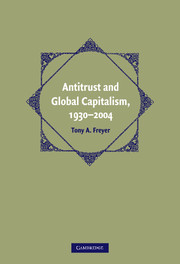Book contents
- Frontmatter
- Contents
- Acknowledgements
- Antitrust and Global Capitalism, 1930–2004
- Introduction
- 1 Reconstituting American Antitrust, 1937–1945
- 2 Protectionism over Competition: Europe, Australia, and Japan, 1930–1945
- 3 American Antitrust since 1945
- 4 Japanese Antitrust since 1945
- 5 Antitrust in Postwar European Social Welfare Capitalism
- 6 Antitrust Resurgence and Social Welfare Capitalism in Postwar Australia
- Conclusion
- Index
Conclusion
Published online by Cambridge University Press: 03 May 2010
- Frontmatter
- Contents
- Acknowledgements
- Antitrust and Global Capitalism, 1930–2004
- Introduction
- 1 Reconstituting American Antitrust, 1937–1945
- 2 Protectionism over Competition: Europe, Australia, and Japan, 1930–1945
- 3 American Antitrust since 1945
- 4 Japanese Antitrust since 1945
- 5 Antitrust in Postwar European Social Welfare Capitalism
- 6 Antitrust Resurgence and Social Welfare Capitalism in Postwar Australia
- Conclusion
- Index
Summary
Amid persistent resistance to Americanization, divergent capitalist economies changed from opposing to supporting antitrust. As businesses throughout the world employed large-scale corporations and cartel practices to ameliorate risk, antitrust became a process whereby capitalist societies and governments acquired and applied a public discourse of economic and social conflict resolution in order to impose accountability upon expanding yet distinctive forms of managerial capitalism, especially big business operating as multinational corporations. This focus reveals how beginning in 1937–38 New Deal liberals reconstituted antitrust to embrace various social-welfare and efficiency goals based on institutional economic theories. From the 1970s on, however, the U.S. government, legal-economic experts, and the courts used Chicago economic theories to reshape an efficiency standard defined primarily in terms of consumerism and technological innovation. The same focus explains why during the Great Depression and World War II liberal-democratic and authoritarian nations alike opposed American-style antitrust and then reversed course after 1945 to adopt it selectively as divergent systems of liberal capitalism emerged. The present study of changing antitrust institutions and policies in the United States and between the United States and other capitalist economies suggests that internationalization involved processes of institutional and cultural accommodation within the social order which were politically and culturally contingent as well as contested among elites.
Each chapter of this book sets out perspectives on the processes of accommodation. According to Keynesian or Chicago macroeconomic theories, corporate managers mediated risk within autonomous markets conditioned by governments' monetary, tax, labor, currency exchange, tariff, and social-welfare policies.
- Type
- Chapter
- Information
- Antitrust and Global Capitalism, 1930–2004 , pp. 393 - 406Publisher: Cambridge University PressPrint publication year: 2006

